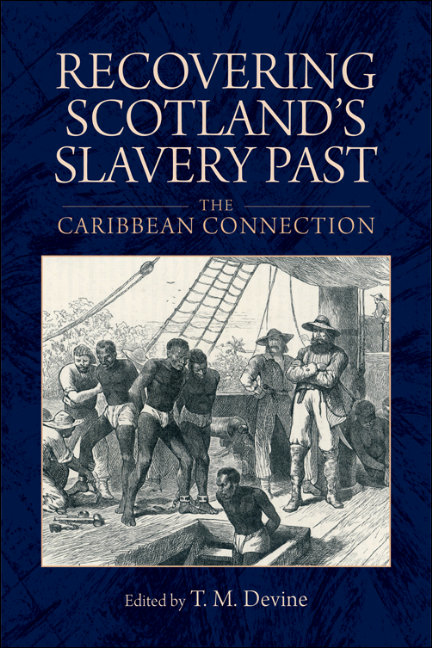Book contents
- Frontmatter
- Contents
- List of Illustrations and Tables
- List of the Contributors
- Acknowledgements
- Foreword
- map
- Introduction: Scotland and Transatlantic Slavery
- 1 Lost to History
- 2 Yonder Awa: Slavery and Distancing Strategies in Scottish Literature
- 3 Early Scottish Sugar Planters in the Leeward Islands, c. 1660–1740
- 4 The Scots Penetration of the Jamaican Plantation Business
- 5 ‘The habits of these creatures in clinging one to the other’: Enslaved Africans, Scots and the Plantations of Guyana
- 6 The Great Glasgow West India House of John Campbell, senior, & Co.
- 7 Scottish Surgeons in the Liverpool Slave Trade in the Late Eighteenth and Early Nineteenth Centuries
- 8 Scotland and Colonial Slave Ownership: The Evidence of the Slave Compensation Records
- 9 ‘The Upas Tree, beneath whose pestiferous shade all intellect languishes and all virtue dies’: Scottish Public Perceptions of the Slave Trade and Slavery, 1756–1833
- 10 ‘The most unbending Conservative in Britain’: Archibald Alison and Pro-slavery Discourse
- 11 Did Slavery make Scotia Great? A Question Revisited
- Conclusion: History, Scotland and Slavery 246
- Index
Foreword
Published online by Cambridge University Press: 15 December 2017
- Frontmatter
- Contents
- List of Illustrations and Tables
- List of the Contributors
- Acknowledgements
- Foreword
- map
- Introduction: Scotland and Transatlantic Slavery
- 1 Lost to History
- 2 Yonder Awa: Slavery and Distancing Strategies in Scottish Literature
- 3 Early Scottish Sugar Planters in the Leeward Islands, c. 1660–1740
- 4 The Scots Penetration of the Jamaican Plantation Business
- 5 ‘The habits of these creatures in clinging one to the other’: Enslaved Africans, Scots and the Plantations of Guyana
- 6 The Great Glasgow West India House of John Campbell, senior, & Co.
- 7 Scottish Surgeons in the Liverpool Slave Trade in the Late Eighteenth and Early Nineteenth Centuries
- 8 Scotland and Colonial Slave Ownership: The Evidence of the Slave Compensation Records
- 9 ‘The Upas Tree, beneath whose pestiferous shade all intellect languishes and all virtue dies’: Scottish Public Perceptions of the Slave Trade and Slavery, 1756–1833
- 10 ‘The most unbending Conservative in Britain’: Archibald Alison and Pro-slavery Discourse
- 11 Did Slavery make Scotia Great? A Question Revisited
- Conclusion: History, Scotland and Slavery 246
- Index
Summary
SCOTLAND'S CONNECTIONS TO SLAVERY can seem tenuous, almost nonexistent. After all, few vessels left Scottish ports for Africa to participate in the horrific slave trade. By the end of the eighteenth century, when England had a black population of about 15,000, perhaps fewer than one hundred black slaves resided in Scotland. Furthermore, Scots were in the vanguard of the abolitionist movement; and Scotland can pride itself as a pioneering abolitionist nation. A country that was about 10 per cent of the United Kingdom population contributed at times about a third of the petitions to Parliament advocating abolition of the slave trade. Iconic figures such as James Ramsay and William Dickson were in the forefront of the opposition to the slave trade. Moreover, in Duncan Rice's view, scholars of the Scottish Enlightenment ‘perfected most of the eighteenth century's rational arguments against slavery’. Scottish philosophers discussed slavery at greater length than their continental counterparts. Adam Smith's famous The Wealth of Nations contains a condemnation of the slave trade and slavery not only as morally repugnant but as economically inefficient. Is it any surprise that many general histories of modern Scotland fail to mention slavery at all?
But the essays in this impressive collection make clear that, if Scots think their country has few or no connections to slavery, they are sorely mistaken. In effect, they are engaging in a form of collective amnesia, for in fact Scotland's connections to slavery were extensive. Scots participated fully in slave trading from ports such as Liverpool, Bristol and London. At the height of the slave trade, a fifth of the ship captains and two-fifths of the surgeons manning slavers out of Liverpool, the world's major slave-trading port at the time, were Scots. The image of Scots, dressed in tartan, playing golf by the slaving fort of Bance Island, Sierra Leone, points to the quotidian nature of Scottish involvement in that nefarious business. One Scottish slave trader thought so familiarly of slavery that he named his vessel after his daughter. This book shows that Scots owned and managed enslaved people in many New World slave societies – from Maryland to Trinidad, from St Croix to St Kitts.
- Type
- Chapter
- Information
- Recovering Scotland's Slavery PastThe Caribbean Connection, pp. xiii - xvPublisher: Edinburgh University PressPrint publication year: 2015



